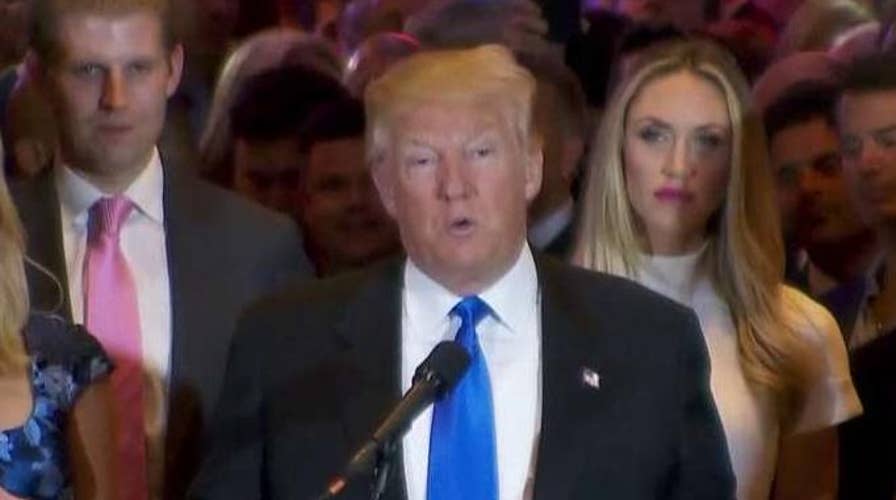Can Trump self-fund a general election campaign?
On 'Special Report,' James Rosen explains why campaign veterans say Trump's 'air war' on Clinton is not enough
When she first sought elective office in 2000, capturing the U.S. Senate seat from New York once held by Robert F. Kennedy, then-First Lady Hillary Clinton inherited her husband’s Democratic political machine – the largest and most effective the country had seen since the Kennedy era.
Now, as a former senator and secretary of state, Clinton has retooled that machine for the digital age, in ways that far exceed even the vaunted operation she put together for her bitter 2008 primary struggle against Barack Obama.
Clinton’s reported $5 million technology and data mining operation, built upon the pioneering digital apparatus of the Obama campaigns, is allowing her to micro-target swing voters down to their purchasing, reading and media-consumption habits.
From an original launch team of dozens in her Brooklyn headquarters, Clinton’s paid staff has expanded to nearly 800 people, operating out of offices in 28 states. Published reports place her volunteer army at upwards of 10,000 and she is said to employ a squadron of paid consultants four times that maintained by Donald Trump.
The real estate mogul, by contrast, reportedly has a campaign staff of about 100 people, a skeletal infrastructure with no sizable communications team, digital operation or research division. After effectively clinching the nomination with his big win in Indiana on Tuesday, Trump, speaking from his Trump Tower headquarters in Manhattan, boasted of having spent only $900,000 compared to the estimated $8 million that his opponents, and the Super PACs supporting them, poured into the state. “To me,” he said, “that's the way it's supposed to be.”
Lean and mean: not necessarily the image we associate with the gilt-edged aura of luxury that Trump has cultivated in three decades on the national stage. But there is no question that his campaign to date has been vastly outspent by those of his rivals and the Super PACs supporting them.
The question, now that Trump has cleared the field of Republican rivals, is whether the “air war” that proved so effective in the G.O.P. primary, dependent on Trump’s outsized celebrity and canny use of mass media, can possibly prove victorious against the “ground game” that Clinton and the Democrats will have in the fall.
“The primaries are a totally different animal,” said Brad Blakeman, a veteran of the presidential campaigns of both Presidents Bush. “The things that got Trump to where he is [are] not necessarily the things he'll need to continue….He is not used to the organizational style of a political campaign, the accoutrements of a campaign from the grassroots up. Not only can you rely on earned media; you must rely on paid media, staffing, advertising.”
“These things are like startup businesses,” said Simon Rosenberg, a Democratic strategist and founder of the progressive Washington think tank NDN. “They need time to work their way through, and you make mistakes and you learn through it. He's starting very late; he's not ever done this before. So I think one of the great challenges for Republicans this cycle is the lack of sophistication in the Trump campaign and the struggle he's having bringing other Republicans onboard.”
Since Trump’s liquid net wealth is not sufficient for him to invest the $2 billion typically needed to wage a general election campaign, the billionaire real estate mogul will probably need to abandon the self-funding posture he has adopted for the primaries and launch a robust fundraising operation.
Party insiders who gathered for the Republican National Committee’s Spring Meeting in Hollywood, Florida last month heard Trump’s top campaign operative, Paul Manafort, promise them in a closed-door session that Trump, as the party’s nominee, would help G.O.P. state organizations and down-ballot candidates raise money through joint fundraising agreements.
“He has to hit the ground running for a general election raising money, and he is going to have to spend a lot of time doing it,” said Blakeman, a Fox News contributor and lecturer at Georgetown University.
Trump’s dedication to the fundraising task could help smooth over some bruised feelings after a primary season in which the G.O.P. frontrunner publicly and regularly assailed the party itself for presiding over a “rigged” nominating process.
“Part of the deal for Trump is making sure he's able to court these delegates, many of them grassroots activists, who are going to pick up the phone and make those calls and knock on doors,” said Mercedes Schlapp, another veteran of the George W. Bush administration. “The Republican National Committee[ has] kind of a natural organizational base that he's going to need in many, if not all, of the fifty states.”
Despite Trump’s now-infamous declaration, in Rome, New York ahead of the Empire State’s primary in April, that the RNC “should be ashamed of themselves for allowing this kind of crap” in the delegate-selection process, many state party chairs at the Spring Meeting seemed nonchalant about the remark and expressed the simple desire for the nominating process to wrap up swiftly.
That has now happened, and all indications are that the party will indeed consolidate behind the singular figure who, as a first time candidate, managed to upend just about all known conventions and metrics of the political game.
RNC Chairman Reince Priebus tweeted late Tuesday that Trump is now the party’s “presumptive nominee,” and Priebus’s chief strategist, Sean Spicer, told Fox News that Republicans disaffected by Trump’s slashing style and controversial policy prescriptions “need to understand the big picture.”
“We need to focus on the general election,” Spicer told Martha MacCallum on “America’s Newsroom” on Wednesday, “and beating Hillary Clinton.”
Fox News’ Guerin Hays contributed to this report.













































